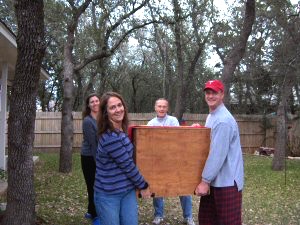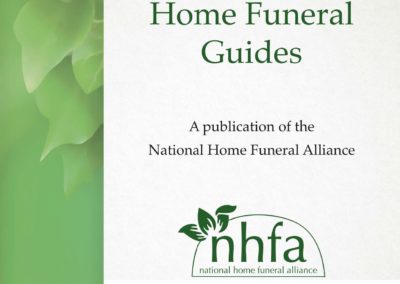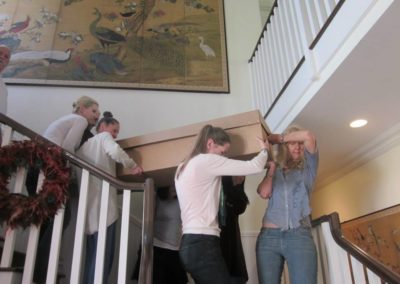If you’re interested in home funerals or natural burial then you’ve probably heard of Lee Webster. She’s a prolific author and educator who advocates for common sense policy for how we care for our dead. Just in case you’re not familiar with Lee’s work, I’m excited to re-print some of her pieces that feel most relevant and important in our current moment.
“How Funeral Directors Can Support Home Funeral Families” was reprinted below with permission from Lee. This article was written by Lee Webster with the assistance of licensed funeral directors Lindsay Soyer, Nora Menkin, Todd Winninger, Amy Cunningham, Rhea Mitts, Kim Forsythe, Bob Fertig, and Ryan Fredregill. Photo credits: Roger Erikson, Olivia Bareham.
This piece because is an invitation to funeral directors and other professionals to participate – and benefit from – a shift toward a more intimate deathcare experience.
How Funeral Directors Can Support Home Funeral Families
How can funeral directors assist families who choose home funerals? The most important support funeral directors can provide home funeral families is the compassionate understanding that this is something families feel called to do for their loved one and themselves, their friends, and community. Home funeral families by and large are looking for simplicity, self-reliance, personal responsibility, and a shared, intimate experience that only they can conceive of and conduct.
This doesn’t mean that home funeral families never need or want funeral directors to be involved. In some instances, it may be impractical to try to tend to all the details without assistance. Weather, family locations and travel plans, weekend paperwork filing, autopsy, organ donation, or any number of other factors can contribute to the decision to hire professional help. Families are looking for choice in what goods and services fit their particular circumstances and needs.
Information
The most important service that funeral directors provide for home funeral families is information: time limitations on filing, refrigeration requirements, what is needed for filing the death certificate, how the transport/burial permit is acquired and processed, and what to look for if more attention is necessary for body care. While this seems like a conflict of interest when one is trying to earn a living by performing these tasks, it makes sense to provide educational support to ensure that the family is getting it right and has a satisfactory experience.
Completing the death certificate
Sometimes funeral directors can help expedite death certificate paperwork. The next-of-kin may be aware of mandatory state requirements for filing, have all good intentions and the information at the ready, but if a death occurs on a weekend when local offices are closed or it is necessary to expedite the electronic paperwork filing due to facility or hospital removal needs, a professional may be the only one to have direct access to filing. Or it may simply be beyond the family’s ability to file the paperwork at that time.
“Home funeral families are looking for simplicity, selfreliance, personal responsibility and a shared, intimate experience…”
Transporting the loved one to the home
In most states, the law confirms next-of-kin’s right to custody and control, including removal and transportation with appropriate paperwork. However, nursing homes or hospitals often have policies stating that a licensed funeral director needs to make the removal. Even in institutions that are more family—and law—conscious, the family may not have access to an appropriate vehicle for removal to the home. And if it is not possible to obtain the transport/burial permit within the time frame required by the releasing institution, it may be prudent to hire a funeral director to provide transportation home.
Assistance with body preparation
Although most home funeral families want to have an intimate, non-professional experience, there are some unforeseen and rare circumstances—such as rapid decomposition, edema, tissue gas, leakage, purge, signs of putrefaction, trauma, organ donation, autopsy, or other symptoms—that can occur. A sympathetic funeral director who can respond with technical support when needed, teach and assist without taking over unless requested, will be an invaluable partner to home funeral families.
Unobtrusive assistance with logistics such as determining appropriate cooling techniques, moving the body, casketing, and general planning may also be helpful while keeping the family in charge. In some areas of the country, it is not unheard of for families to request that bodies be embalmed, sometimes with nontoxic embalming fluid, and returned to the home for vigil.
Use of prep room for body care
Although most home funerals occur in the home, it may not be feasible for many reasons for the actual body care to be performed there. Some spiritual communities, such as the Jewish burial society chevra kadisha, perform body care in a rented body prep area of a funeral home. That spiritual community may then return the body home, host the body during the vigil period in its own facility, or in the funeral home. Funeral homes could offer rental space for body prep to anyone, supervised or not depending on the circumstances, and whether or not the deceased is going to be removed to a different location for vigil afterward.
Delivery of casket to the home
Despite the FTC rule about consumers providing their own containers without penalty, most families will still look to their local funeral director to purchase caskets and shrouds. Delivering the casket ahead of time, including cremation containers to be decorated and prepared by visitors and family members, is a welcome value added service.
Transporting to gatherings and final disposition
Not all families have access to an appropriate vehicle, church cart, or other tools for safely transporting the deceased to what could be a series of destinations, culminating in burial or cremation. A funeral director willing to supply transportation as an á la carte purchase offers peace of mind to families who may then successfully handle other aspects of the funeral.
Organizing delivery of a vault to the cemetery
Consumers do not have direct access to purchasing vaults as a general rule, and may require funeral director assistance in meeting cemetery demands. This is an opportunity to demonstrate willingness to assist families that may not be lucrative but will show goodwill that results in trust and further consumer purchases.
Filing obituary death notices
Death notices are often not accepted by newspapers that come directly from the family without an accompanying death certificate, and some online tribute sites will only accept content from a funeral director. Families may need help assuring the obituary editor that the notice is genuine and not a hoax.
Organizing arrangements
Funeral directors may be called upon to aid the family with a checklist of things that go into having a service and who needs to be contacted for flowers, clergy, funeral celebrant, military honors, getting a burial flag, filing for social security and a host of other services. Rather than arranging these things for the family, as would be the case for a conventional funeral, simply providing the checklist may be helpful.
Locating a crematory or cemetery
Funeral directors could mean help locate a crematory that will accept bodies from the family or ensure their onsite crematory does. Families may also be looking for a cemetery that does not require a vault, have need of a particular religious cemetery, or information about home burial.
Providing goods
- Blank death certificate
- Alternate container
- Body pouch
- Caskets
- Casket rental
- Vault
- Urns
- Shroud
- Shrouding board
- Lowering straps
- Grave lining
- Church truck
How can home funeral guides assist in delivering what home funeral families want?
Incorporating home funeral guides into a funeral home’s professional service offerings is a choice many firms are making for the simple reason that guides act as a bridge to the family. Many home funeral families are opposed to having a funeral director in the home because they want it to be organic, simple, and intimate which, in their minds, is incompatible with having a professional present. This perception is not limited to those who are looking for a less expensive alternative; this has to do with creating an authentic family-centered experience.
Home funeral guides are not new. There have been people called to assist families in birth and death forever, often from other professions such as clergy and local midwives. But the deliberate organization and training of guides is relatively new. Home funeral guides seek to empower families by teaching old skills, along with today’s added responsibilities and legalities. They are not, as Elizabeth Knox of Crossings: Caring for our own at death says, “warmer, fuzzier funeral directors.”
Home funeral guides are not currently certified by and third party organization. They are trained not to do the work of preparing the body, providing transportation, filing the paperwork, or anything a professional is licensed to do, but to assist the family with information about all of these things and more. Home funeral guides are trained to know the law, know when bodies need additional attention, assist in finding local resources, and a myriad of other skills and educational services. They make sure things are done properly, safely, and legally; but more importantly, they are there as back-up support to family members and friends who may want to care for their own but are not confident about how. Any money changing hands is for educational services only. Any hands-on work is strictly voluntary at the request of the family.
A good working relationship between a home funeral guide and a funeral director can result in better communication between the family and the professional, and ensure quality of service when professionals are not offered entry. Families may be more receptive to hiring funeral directors for specific services when a guide is involved who can assess the families’ capacity for completing tasks properly and on time, and refer for goods and services as needed.
What do funeral directors stand to gain and lose by supporting home funerals?
Revenue is, of course, at the top of the list of things funeral directors stand to lose. Funeral directing is a business, with overhead and employees and all the other responsibilities of running a profitable enterprise. Funeral directors need a reason to support home funeral families and still be able to stay in business.
Revenue is also at the top of the list of what they have to gain. One argument is that the funeral industry is already losing significant revenue due to the rise in direct cremation. At 50% nationally and well over that in some states, direct cremation has reduced revenue from embalming services and other preparation of the body (OPB), casket sales, rentals of chapels and rooms for visitations and wakes, transportation services, sheltering, refrigeration, and all the incidental purchases once relied upon to make a living at the profession. Home vigils, home funerals, and green burials, while occurring outside the standard funeral practice and premises, actually offer viable opportunities to replace revenue centers that are now going missing due to other factors and influences.
There is no standard General Price List (GPL) for home funerals. In Essentials for Practicing Home Funeral Guides there is a suggested price list template that lists goods and services specifically for home funeral families. The list consists of á la carte line items, rather than bundling or charging non-declinable basic fees that cover overhead home funeral families will not be using. What this list suggests is that the savvy funeral director will find alternate revenue centers that meet the needs of these families to offset decreased revenue caused by avoidance of the conventional full service funeral.
One of the most compelling reasons for funeral directors to embrace home funeral families is the chance to improve public image and repair damage to the industry’s reputation. There is a love/hate disconnect in how people view funeral directors in this country. On the one hand, the public perception of the industry at large is negative, and on the other, we love and trust our local funeral director.
Reaching out to genuinely support home funeral families can help to heal that rift while building increased trust within individual communities. Another advantage to funeral directors providing support services for home funerals is that it is the only way for them to maintain any sense of quality control when care for the deceased is not under their roof. No one goes into the profession without some compulsion to help families and individuals through difficult times. Knowledgeable, respected funeral directors are dedicated to ensuring that safety protocols are in place and followed, legal requirements are fulfilled, and families receive the experience they are hoping to achieve. If for no other reason, funeral directors who care about the dead and about the living who tend them must stay engaged in the business of after death care by supporting those who seek their expertise but want to exercise their legal rights with more involvement, responsibility and self-reliance.
Developing green home funeral business as part of your brand
With the growing interest in green burial and noninvasive after death care practices rising, adding compatible products and services is just good business. Providing these services and demonstrating a willingness to serve in a different capacity than competing funeral homes or even the same one as in years past may help change public perceptions for the better, whether or not families choose to purchase those services. Developing a strong relationship to the home funeral community, including religious and ethnic groups, may contribute to a perception of openness, fairness, compassion and generosity.
Consumers are looking for biodegradable caskets and shrouds, preferably made locally, and they are also becoming increasingly aware that what looks green may not be—the wicker basket that looks great on the green wall until they are reminded that they are made of nonnative materials shipped long distances, for instance. Are they biodegradable? Are they “green”? On the one hand, it’s up to the informed consumer to decide whether the footprint of transporting the products outweighs the functional aspects of natural decomposition. On the other, greenwashing, the act of deliberately marketing goods or services deceptively by hiding dubious aspects of their environmental profile, is a serious offense. Funeral directors will need to negotiate that territory carefully to provide what the public wants in a way that speaks to integrity and honesty, a critical element in rebranding.
Another branding opportunity to bridge public perception and enhance business is by offering professional assistance and goods to family-directed funerals. As more people seek novel products and explore updated practices—previously outdated, now desirable and hip—funeral directors need to be more flexible than ever, providing core conventional services while at the same time offering a whole new set of goods and services to meet the growing needs for selfsufficiency and affordable, eco-friendly goods. Home funerals represent a crossover between both worlds, emphasizing truly traditional practices, while uniting the old with the new.
How do home funeral friendly funeral directors explain their position to other licensed funeral directors? Here’s what some told us:
“I am here to provide the family what they want, not what I want. I will do whatever it takes, within legal, ethical and technical boundaries to accommodate a family and their loved one.”
“I try and encourage them to empower families to take on whatever they’re comfortable with, whether that’s pieces of the process, or the whole thing. It’s a spectrum!”
“It’s totally appropriate to shift perceived risk/liability to the family, in the case of a home funeral. Examples might be having the family sign waivers if they’re handling transportation or body care, but the funeral director is signing the death certificate. Finding ways to alleviate liability from the funeral home makes it easier for funeral directors to let go and allow the family to have control.“
“In many ways, home funerals can be much easier for funeral directors. In theory, any part of the process the family is handling is one less thing the funeral director has to do him/herself.”
“I remind them about legalities: that families/communities have the right to choose home funerals, the lack of legal requirement for embalming/funeral home involvement, things like that.”
“Home funerals represent a crossover between both worlds, emphasizing truly traditional practices, while uniting the old with the new.”
“Many families who choose home funerals might otherwise choose direct cremation rather than full service, conventional burials. This means that home funeral families don’t necessarily represent significant lost income to funeral homes.”
“Many funeral homes are seen as stodgy and behind the times. Being involved with something that seems new and modern (ironically!) like home funerals and green burial is a big boost for their visibility and reputation, and their perceived relevance and viability in the community.”
This is our latest free course offering – previous events have included “Opportunities in Green Burial” and “How to Host a Virtual Funeral“. All of our events are intended as training for professionals to use on the job. Certificates are available when you complete a learning check. There is always an opportunity to meet and ask questions of the instructor.




